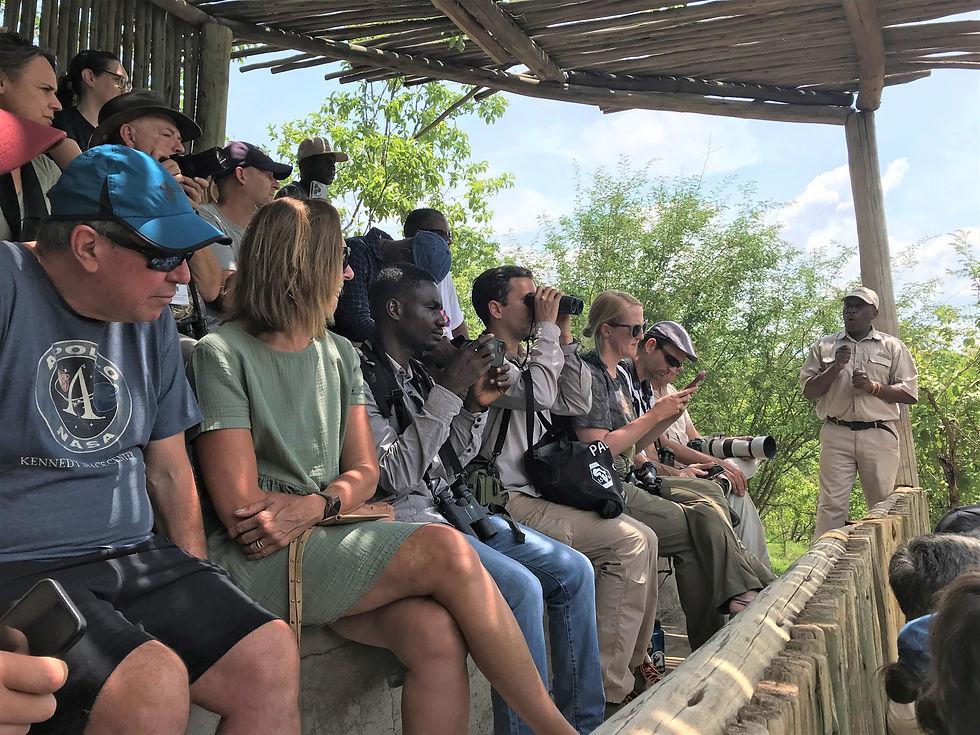By Samuel Boakye Yiadom
06 December, 2022

Samuel Boakye Yiadom on the Zambezi River. Photo courtesy of Samuel Boakye Yiadom.
At long last, the 15th Pan-African Ornithological Congress took place from the 21st to 25th November 2022, with about 300 attendees from 60 countries from Africa, Europe, America and Asia converging at Victoria Falls, Zimbabwe. PAOC15 was scheduled to take place two years ago, but was postponed due to Covid-19. I had waited eagerly for this congress, with its promise of new ideas and opportunities for early career ornithologists like myself.

Samuel Boakye Yiadom presenting at the 15th PAOC. Photo by Nico Arcilla.
My presentation was entitled, “Arrival time and habitat preference of migratory birds in a peri-urban area in northern Ghana”, and was based on my undergraduate research at University for Development Studies. The study focused on migratory birds that winter in Africa, their arrival times and habitat preferences. It was a great privilege and honor to have received a slot to present in the symposium “Integrating science, policy and development to address unsustainable land use linked to African-Eurasian migrant landbird declines,” which was convened by Dr. Samuel Temidayo Osinubi.

The Wood Warbler (Phylloscopus sibilatrix) is one of many migratory bird species that winters in Africa and nests in Eurasia. Photo by Nico Arcilla.
The entire week was full of exciting and fascinating activities, with 6 plenaries, 13 round table discussions, 26 symposia, and over 200 talks. I had the privilege to attend symposia on such topics as “Tracking migrants to reveal the diversity of spatiotemporal strategies and ultimately understand the ecology of migration,” which was convened by Prof. Kasper Thorup, “The plight of African hornbills and conservation innovation,” which was convened by Dr. Lucy Kemp, and a round table on “Developing capacity of early-career conservation leaders in Africa,” which was led by Dr. Julius Arinaitwe and Ms. Sherilyn Bos. I also attended the symposium entitled “CMS Vulture Multi-species Action Plan: Implementation in sub-Saharan Africa – an assessment of progress,” organized by Dr. André Botha.

A Trumpeter Hornbill (Bycanistes bucinator) reaches into a tree cavity to feed his mate. Photo by Nico Arcilla.
The 3rd day of the week was reserved for “Mid Congress Morning Excursions,” and I was privileged to take a tour on the Zambezi River in the morning with a group of nature enthusiasts and researchers. We followed up our river tour with a visit to the “vulture restaurant” at the Victoria Falls Safari Lodge, where vultures are given supplementary food every day at 1pm; the birds gather ahead of time in anticipation of their free lunch! In the afternoon we headed to Victoria Falls National Park and, in the evening, we were treated to a Boma Dance where we enjoyed traditional songs, dance, and culture.

An African Openbill (Anastomus lamelligerus) on the banks of the Zambezi River. Photo by Nico Arcilla.
On day four, I attended symposia including “Vulture safe zones,” convened by Dr. Hanneline Smit-Robinson, and “West African birds as indicators of biodiversity” convened by Dr. Nico Arcilla, and a round table on “Tackling the illegal killing for birds for belief-based use,” convened by Ms. Salisha Chandra and Dr. Darcy Ogada. On the fifth and final day of the congress, I attended a symposium on ‘Innovation in vulture conservation: a socio-environmental perspective,” convened by Prof. William Bowerman and Ms. Linda van den Heever. All these symposia have added to my knowledge, and the energy and effort the presenters put into their work encourages me to do more, including educating more young people in the field of biodiversity conservation and encouraging them to develop interest in ornithology.

Victoria Falls Safari Lodge staff member Moses educating us about the need to conserve vultures, as many species are critically endangered, before opening the vulture restaurant. Photo by Nico Arcilla.
I’ve learned from professionals that to be a successful ornithologist, I must stay focused, keep a positive energy, and be devoted to nature and birds. The opportunity I had to attend the PAOC15 will go a long way to impact the younger generation and my colleagues and fellow students positively. Such programs are in themselves a great motivation, as they also provide a chance to meet new people and establish new relationships, exchange ideas and also learn from what other people are doing in other parts of the world. In my case, it allowed me to travel outside my home country for the first time and gain some entirely new perspectives!

A White-backed Vulture (Gyps africanus) waits in anticipation of the opening of the Victoria Falls Safari Lodge vulture restaurant. Photo by Nico Arcilla.
I would like to take this opportunity to advise my colleagues, students, and fellow conservationists that we can win the war against extinction if we collaborate and share information and ideas in our quest to find solutions to the growing blight of global biodiversity loss. I would like to thank IBCP and the Migrant Landbird Study Group for enabling me to travel from Ghana to attend the PAOC15. I really appreciate your support.

Samuel Boakye Yiadom at Victoria Falls. Photo by Nico Arcilla.

コメント